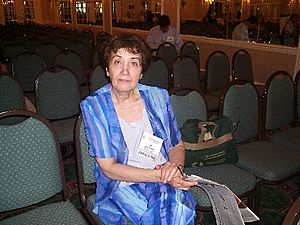Irina Beletskaya facts for kids
Quick facts for kids
Irina Beletskaya
|
|
|---|---|
| Ирина Белецкая | |

Beletskaya in 2005
|
|
| Born | March 10, 1933 |
| Citizenship | Russian |
| Alma mater | Moscow State University |
| Known for | Studies on aromatic reaction mechanisms, palladium and nickel catalysed methods for C-C bond formation |
| Awards | Lomonosov Prize (1974)
Demidov Prize (2003) IUPAC 2013 Distinguished Women in Chemistry or Chemical Engineering Award (2013) |
| Scientific career | |
| Fields | Organometallic chemistry |
| Institutions | Moscow State University |
Irina Petrovna Beletskaya (Russian: Ири́на Петро́вна Беле́цкая; born on March 10, 1933) is a famous Russian chemistry professor. She teaches at Moscow State University. She is an expert in organometallic chemistry, which is a special type of chemistry. This field studies compounds that have bonds between carbon and metal atoms.
Professor Beletskaya is known for her work on how chemical reactions happen. She also helped create new ways to form carbon-carbon bonds. These bonds are the backbone of all organic molecules. She used special helpers called palladium and nickel catalysts. Catalysts are substances that speed up chemical reactions without being used up themselves. She even made these reactions work in water! Her research also helped open up the study of compounds with rare-earth metals, called organolanthanides.
Contents
A Life in Science
Irina Beletskaya was born in Leningrad (now called St. Petersburg, Russia) in 1933. She loved chemistry from a young age. She studied at Lomonosov Moscow State University. In 1955, she finished her first degree. Her early research focused on compounds containing arsenic.
Becoming a Doctor of Chemistry
In 1958, she earned her Candidate of Chemistry degree. This is like a Ph.D. in other countries. For this, she studied how certain chemical reactions happen. She looked at how ammonia affected reactions of a specific mercury compound. By 1963, she received her Dr.Sci. degree from the same university. This is a higher degree, showing even more advanced research.
Leading the Way
In 1970, Irina Beletskaya became a full Professor of Chemistry. She still works at Moscow State University. She leads the Organoelement Chemistry Laboratory there. This lab studies compounds with bonds between carbon and other elements.
Her hard work was recognized. In 1974, she became a corresponding member of the Academy of Science of USSR. Later, in 1992, she became a full member. This means she joined the Russian Academy of Sciences. This is a very high honor for scientists in Russia.
Global Chemistry Leader
Professor Beletskaya also played a big role in international chemistry. From 1991 to 1993, she was the president of the Organic Chemistry section of IUPAC. IUPAC is a worldwide organization that sets standards for chemistry. She also helped with a committee on chemical weapons until 2001. Today, she is the main editor for the Russian Journal of Organic Chemistry.
Important Discoveries
Professor Beletskaya's early research looked at how organic reactions work. She studied compounds with metal-carbon bonds. She also explored how certain catalysts, like those with lanthanide metals, could be used. She worked with Professor O. Reutov on special reactions involving carbon.
Focus on Catalysts
Later in her career, Professor Beletskaya focused on catalysts made from transition metals. These catalysts are very important for making chemical processes more efficient and cheaper. Her current research at Moscow State University is exciting. She is looking at how to use carbon dioxide. This gas is often seen as a problem, but she wants to turn it into useful things. She also studies how it reacts with other compounds called epoxides. This work could help create new ways to make renewable energy.
Awards and Recognition
Irina Beletskaya has received many awards for her amazing contributions to chemistry. She is known as one of the first important female chemists in Russia. Her work helped open doors for other women in science there.
Her pioneering research in making new organometallic compounds has been very important. It has created a strong base for future organic chemists. She also pushed for using rare-earth elements in organic chemistry. This led to new textbooks and changed how organic chemistry is taught around the world. Her work shows that adding other elements to carbon-based studies is very valuable.
Here are some of the honors she has received:
- Lomonosov Prize, 1974.
- Mendeleev Prize, 1979.
- Nesmeyanov Prize, 1991.
- Demidov Prize, 2003.
- State Prize, 2004.
- IUPAC 2013 Distinguished Women in Chemistry or Chemical Engineering Award, 2013.
See also
 In Spanish: Irina Beletskaya para niños
In Spanish: Irina Beletskaya para niños

